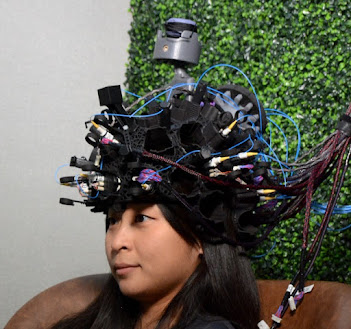- General
- June 19, 2021
- 8 minutes read
Spotlight: This Startup Wants To Read Your Mind, Really
Today, we’ll be doing something quite rare which is spotlighting a startup. It’s rare that we do that, but this…
Today, we’ll be doing something quite rare which is spotlighting a startup. It’s rare that we do that, but this is a startup we think is very important to know about. The startup is Kernel, one working on a human brain-machine interface.
- Kernel was founded by Bryan Johnson, a serial entrepreneur. He founded payments company Braintree which sold to PayPal for $800mn in 2013, and with a fortune gotten from that sale, he parlayed it into building an ambitious startup.
- Kernel has built a helmet that frankly speaking, reads people’s minds. But chill, it’s not as dystopian as it sounds, it reads brain signals that are crucial to the work of neuroscientists and researchers.
Below is a picture of Kernel’s bulky, buggy-looking, costly (price: $50k) helmet loaded with sensors to read signals from the human brain;
 |
| Credit: Kernel |
Kernel initially worked on neural implants in the brain to harvest tons of data but faced so many difficulties there and pivoted to that helmet (named Flux) you see above. The helmet’s operating principle is simple – equipped with electrodes and sensors as close as possible to someone’s brain neurons, then use the electrodes to detect when the neurons fire and send that information to a computer.
- Usually, neuroscientists studying the human brain have these big, bulky intertwined machines that can fill a whole room. What Kernel has done is to miniaturize the capability of these machines into dedicated hardware.
As it’s miniaturized these brain-reading machines to a good extent, it also now provides an opportunity for people outside neuroscience such as computer scientists and electrical engineers to study the human brain without having to use dedicated university or government labs.
To note, Kernel hasn’t perfected its tech yet and is still in a phase requiring constant and further development. But yet, it’s already secured customers for its Flux helmet, the first of which are brain research institutions such as the Allen Institute for Brain Science in Seattle.
- Championing grand plans, Kernel founder Bryan Johnson says he has a plan to reduce the price of brain-reading equipment to the smartphone range and put one such helmet in every home.
 |
| Bryan Johnson. credit: Web Summit, licensed under CC BY 2.0 |
For its interesting tech, Kernel is a startup we couldn’t help but spotlight right now. Founded in 2016, it has raised about $110mn to develop its tech, of which half came from founder Bryan Johnson.
You may not have heard of Kernel before now, but have heard of Elon Musk’s Neuralink. They’re both tackling the same issue of brain-machine interfaces but with the difference that Kernel already has a product ready for customers.
In Neuralink’s case, it’s tackling what Kernel previously tried but abandoned – implantable neural implants, which is much harder to implement than external sensors.







